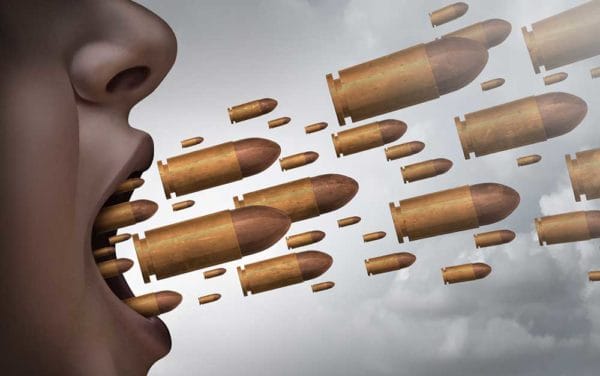Opinion By Larry Keane

There’s peril when media sets out to confirm a narrative instead of reporting facts. Whether it’s criminal violence in America perpetrated by a deranged lunatic or by violent drug cartels in countries beyond our borders, some media outlets will find the flawed logic to argue it is American companies that should be punished.
This results in a disservice to readers and erodes public trust not just in their subjects but also in the Fourth Estate.
Antigun Bias
It’s no surprise The Washington Post published an article critical of the firearm industry. What is surprising is that a news outlet with the motto “Democracy Dies in Darkness” would get so much wrong writing about firearms and gloss over the complicated and strictly-regulated process of firearm exports. The report, written by Bloomberg opinion writer Francis Wilkinson, seemed to blame the firearm industry for corruption and crime in other nations, many with stricter gun control laws than that of the United States. The Washington Post uses words like “morally grotesque,” “murderous,” and “corrupt” to directly connect the industry with “facilitating” violent criminal regimes in other countries, including Guatemala. Other countries that are frequently referenced as receiving firearm exports from U.S. manufacturers include Mexico, Thailand, the Philippines, and even Canada.
That column was preceded by one in Bloomberg chastising U.S. firearm manufacturers for crime, corruption, and violence in Thailand. Bloomberg, of course, is owned by antigun-billionaire Michael Bloomberg, who also funds the gun control groups Everytown for Gun Safety, Moms Demand Action, and Everytown’s agitprop outlet, The Trace.
The misleading narrative of how U.S. firearm exports are regulated was repeated by the Dallas Morning News Editorial Board. In that column, editors attempted to assign blame for lawlessness in Guatemala to U.S. firearm manufacturers.
The Washington Post’s, Bloomberg’s and Dallas Morning News’ repeated mischaracterizations of the export license process and review priorities of the U.S. Department of Commerce, known as the U.S. Munitions List to Commerce Control List reforms, are myopic views to provide the public with an inaccurate account of how firearms and ammunition exports are reviewed and approved. The truth is there are multiple layers of redundancy, and duplicative end-user checks for every single firearm and ammunition license application for export to another country. Firearms are only exported after both the State Department and Defense Department approve a sale, including a specific review to consider human rights records and regional stability.
The Washington Post also references a Congressional letter sent to U.S. Commerce Secretary Gina Raimondo, in which antigun Members of Congress criticize the department for “approving nearly $16 billion in firearms export licenses in the first 16 months after it took over authority over small arms exports from the State Department – a roughly 30 percent increase from the State Department’s rate of approval – while denying only 0.4 percent of applications.” What those lawmakers get wrong, and the article’s author ignores, is that licenses issued by the Commerce Department are valid for four years, while the licenses previously issued by the State Department were only valid for one year. For this reason, the initial license applications in the transition year of 2020 were much higher than the comparable State Department totals.
Likewise, the Congressional letter refers to a Bureau of Industry and Security (BIS) license denial rate of 0.4 percent, lamenting it as extremely low and implying BIS is rubberstamping the approval of firearm export licenses. The truth is firearm exporters do not submit applications for exports to countries they know are prohibited, embargoed or under a policy of denial.
Mexico’s Malicious Legal Maneuver
Bloomberg News has reported on Mexico’s years-long attempt to sue U.S. firearm manufacturers – including Smith & Wesson Brands Inc., Glock Inc., and Beretta USA Corp. – for $10 billion in compensatory damages with the help of the Brady United gun control group. Mexico is unwilling to enforce its gun control laws on their side of the border. Further, officials in Mexico’s federal government and military have been found guilty of corruption from the narco-terrorists plaguing that country. The firearm industry is deeply disturbed by the violence brought by these crime syndicates, often with the assistance of Mexican authorities. However, that doesn’t change the facts. Mexico is responsible for the rampant violence and corruption in their own nation.
“Mexico argues that American gun manufacturers are partly liable for the country’s 23,000 annual gun deaths. The businesses allegedly sell assault rifles that can be easily converted to fire automatically and market their weapons to cartels, violating both US law and Mexican tort law,” reported Bloomberg.
Bloomberg failed to report that Mexico has just one firearm retailer in the entire country, and it’s located on a military base in the heart of Mexico City. An independent investigation showed that the Mexican army “lost” 30 percent of its small arms purchased from the United States. Those are arms only the government can buy yet are being found at crime scenes.
The case was correctly dismissed earlier by the U.S. District Court for the District of Massachusetts but is now being considered on appeal by the U.S. Court of Appeals for the First Circuit.
Facts Matter
The lawful and Constitutionally-protected firearm industry is among the most stringently-regulated industries in the world. Industry members all share an immense sense of pride in the role they play in facilitating the exercise of the Second Amendment by law-abiding Americans. The firearm industry is invested in efforts to improve community safety, including programs that partner with law enforcement agencies at all levels.
This includes Project ChildSafe, which has distributed over 40 million free gun safety kits, including locking devices, free of charge through partnerships with more than 15,000 local police departments in every state and five U.S. territories. It also includes Operation Secure Store and Don’t Lie for the Other Guy, which help to educate neighborhood firearm retailers about the warning signs of illegal straw purchases and how to more securely store their inventory. The firearm industry led the effort to ensure that all disqualifying records are submitted to the FBI’s National Instant Criminal Background Check System (NICS) by championing the FixNICS campaign to ensure the background check system works as intended. So far, the law has been changed in 16 states and in Congress.
NSSF also partners with the American Foundation for Suicide Prevention (AFSP) and the Department of Veterans Affairs to provide firearm ranges and retailers resources to better recognize the signs of mental distress of suicidal ideations.
Media ignore that it’s the firearm industry that has a proven history of spearheading responsible gun ownership initiatives that have led to the lowest levels of unintended firearm fatalities since records first were kept in 1903, according to the National Safety Council’s Injury Facts Report. Instead, they carry the antigun water to blame U.S. companies for the violence committed in other countries.
About The National Shooting Sports Foundation
NSSF is the trade association for the firearm industry. Its mission is to promote, protect and preserve hunting and shooting sports. Formed in 1961, NSSF has a membership of thousands of manufacturers, distributors, firearm retailers, shooting ranges, sportsmen’s organizations, and publishers nationwide. For more information, visit nssf.org

